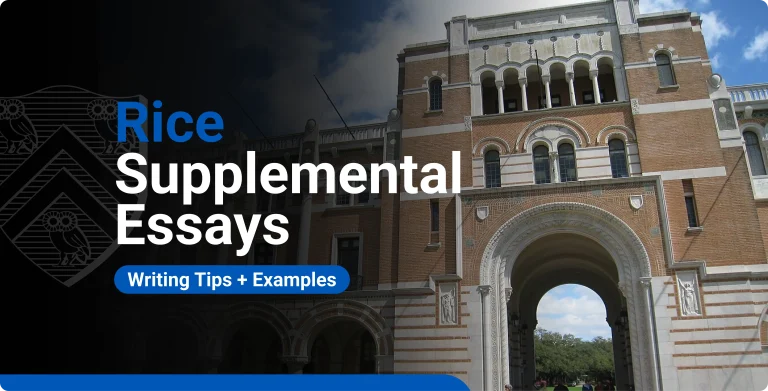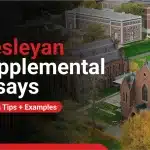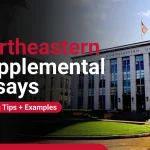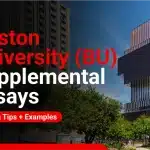Rice University has a pretty competitive admissions process, with a 7.5% acceptance rate. Fortunately, compelling Rice supplemental essays can help boost your application and stand out among other applicants. Rice requires three supplemental essays. If you’re an applicant to the School of Architecture, you have two additional essays.
In this blog, we’ll give you tips and examples on how to write Rice supplemental essays that prove to the admissions team that you’re a perfect fit for the community.
- Rice Supplemental Essay Prompts
- How to Write the Rice Supplemental Essay #1
- How to Write the Rice Supplemental Essay #2
- How to Write the Rice Supplemental Essay #3
- How to Write the Rice Supplemental Essays for the School of Architecture
- Mistakes to Avoid When Writing Rice Supplemental Essays
- Frequently Asked Questions
- Takeaways
Rice Supplemental Essay Prompts
Rice requires a personal statement when applying through the Common App or Coalition. Aside from that, you’ll also need to write three supplemental essays. Here are the prompts for 2024-2025:
- Please explain why you wish to study in the academic areas you selected. (150 words)
- Based upon your exploration of Rice University, what elements of the Rice experience appeal to you? (150 words)
- Please respond to one of the following prompts to explore how you will contribute to the Rice community:
- The Residential College System is at the heart of Rice student life and is heavily influenced by the particular cultural traditions and unique life experiences each student brings. What life experiences and/or unique perspectives are you looking forward to sharing with fellow Owls in the residential college system? (500 words)
- Rice is strengthened by its diverse community of learning and discovery that produces leaders and change agents across the spectrum of human endeavor. What perspectives shaped by your background, experiences, upbringing, and/or racial identity inspire you to join our community of change agents at Rice? (500 words)
If you’re applying to Rice University’s School of Architecture, you will have to submit two more essays:
- Why are you determined to study architecture? Could you please elaborate on your past experiences and how they have motivated you to apply to Rice University and the School of Architecture in particular? (250 words)
- Please expand on relevant experiences and motivations outside of your academic trajectory that have inspired you to study architecture, focusing on aspects that are not accommodated by other prompts in the application (250 words)
Rice’s supplemental essay prompts might seem a bit overwhelming, but it’s all about tackling them strategically. We’ll break them down one by one in the next sections.
How to Write the Rice Supplemental Essay #1
| Prompt: Please explain why you wish to study in the academic areas you selected |
| Word count: 150 words |
This Rice supplemental essay prompt is explicitly asking why you’re passionate about your chosen major/s.
Brainstorming ideas
To help you form a convincing response, here are some brainstorming ideas:
- Repeatedly ask “why?” Dig really deep into your motivations. “I want to study biology.” Why? “Because I like science.” Why? “Because I’m fascinated by how living things work.” Why? “Because I want to contribute to medical research.”
- Think of your experiences. Think about specific experiences that sparked your interest. Was there a book, a project, a mentor, a research opportunity, or even a personal challenge that fueled your passion?
- Connect to Rice. Research Rice’s programs, faculty, and research opportunities in your chosen field. Mentioning specific aspects that resonate with your interests shows you’re genuinely interested in Rice.
Essay structure tips
Once you’re ready with your explanation, here’s how you can structure your response:
- Start strong. Immediately directly address the “why.”
- Give examples. Briefly describe your experiences and interests that shaped your interest in your chosen major/s.
- Answer why Rice. Mention how Rice’s offerings are a perfect fit for your aspirations.
Supplemental essay example
I’ve always been energized by complexity, the kind you find when interests collide, when goals compete, and when no answer is perfect. I first experienced this in Model United Nations, negotiating between economic growth and environmental protection. Later, working for a startup expanding into new markets, I learned that real-world decisions require balancing strategy with responsibility.
That’s why I’m drawn to Rice’s Business major with a concentration in Management. I want to study how organizations grow fast but responsibly and sustainably. I’m also interested in exploring the Policy Studies minor to deepen my understanding of how business and policy shape outcomes on a global scale.
I aspire to help businesses scale in ways that respect both long-term impact and short-term goals. I also hope to design frameworks that make responsible growth possible and profitable. Rice’s emphasis on interdisciplinary problem-solving makes it the ideal place to prepare for this mission.
How to Write the Rice Supplemental Essay #2
| Prompt: Based upon your exploration of Rice University, what elements of the Rice experience appeal to you? |
| Word count: 150 words |
For this supplemental essay, admissions officers want to see if you’ve done your research and understand what makes Rice unique. Aside from just academics, you should also mention the overall environment and opportunities that the institution has.
Brainstorming ideas
To help you pinpoint which aspects of Rice you should talk about, here are some brainstorming ideas:
- Think of the extracurriculars. Are there clubs, organizations, arts programs, or athletic opportunities that align with your interests? How would you contribute to the Rice community outside the classroom?
- Look at the location. Are there opportunities for internships, research, community engagement, or even relaxation in Houston that appeal to you?
- Consider the culture. Research Rice’s unique culture. From the residential college system to the Honor Code, which of these aspects resonate with you and why?
Essay structure tips
Once you’ve done your research and found what elements of Rice resonate with you, here’s how you can write about it:
- Introduce what draws you to Rice. Briefly mention a specific aspect of Rice that sparked your interest and immediately connect it to your aspirations.
- Explain the elements. Explain the specific elements of the Rice experience that genuinely appeal to you. Tie these elements to your interests or future goals.
- Have a forward-looking statement. Summarize your key points and express excitement about attending Rice.
Supplemental essay example
It started with a video of Rice students launching pumpkins off the top of a building. I laughed, but then I ended up reading about the OEDK, where students build real solutions for real people—like the heart surgery trainer designed with local surgeons. I could almost feel my palms itching to build again, like I had when I sketched a prosthetic hand on graph paper at UC Davis.
I imagine myself at Rice, pulling late nights in the OEDK, whiteboarding ideas until my handwriting turns sloppy, then testing, failing, and testing again. I picture conversations spilling out of Ethics classes and into the courtyards of the residential colleges, challenging me to think deeper about the impact of the tools I help create.
At Rice, I see the perfect intersection of engineering and empathy. One day, I hope to build medical devices that are affordable, accessible, and human-centered.
How to Write the Rice Supplemental Essay #3
For the third Rice supplemental essay, you have two options you can choose from. Here they are:
| Prompt option 1: The Residential College System is at the heart of Rice student life and is heavily influenced by the particular cultural traditions and unique life experiences each student brings. What life experiences and/or unique perspectives are you looking forward to sharing with fellow Owls in the residential college system? |
| Word count: 500 words |
In this supplemental essay, you should be able to showcase how your experiences have shaped your perspectives, and how that will add to the diversity of the Rice community.
Brainstorming ideas
To help you think of what makes you unique, here are some brainstorming ideas:
- Recall defining experiences. Consider your family’s cultural heritage, unique customs, or traditions you celebrate. Did joining the speech and debate club, competing in soccer or pursuing passion projects shape your identity? What experiences have significantly shaped your worldview, values, or passions?
- Reflect on your perspective. How have these experiences influenced your perspective on the world? What unique insights or viewpoints can you offer?
- Connect to collaboration. How do you see yourself sharing these experiences and perspectives with others? Are you passionate about mentoring, leading discussions, organizing events, or simply engaging in thoughtful conversations?
Essay structure tips
Once you have a grasp of what makes you unique, here’s how you can write about it:
- Capture your experience or perspective. Start with a hook that introduces an important aspect of your background or perspective. You can hint at how these will contribute to the Rice community.
- Develop two or three core experiences. For each of your experiences, give context, why it’s important, and what you learned. Explicitly connect your experiences to your unique perspective. How do your experiences inform your understanding of certain issues or your approach to problem-solving?
- Talk about engagement. Explain how you plan to share your experiences and perspectives within the residential college system. Would you like to share your cultural traditions through cooking or storytelling? How do you hope to learn from other’s experiences as well?
Let’s say you’re Filipino-American. You can start your supplemental essay by introducing a weekly tradition of visiting your grandmother’s apartment, who’s a first-generation immigrant from the Philippines.
Continue by saying your grandmother always prepared traditional dishes from her homeland. How did this tradition shape you? Maybe you realized the whole experience was also about sharing stories, preserving cultural heritage, and building community.
Once you’ve talked about what you learned from the first experience, you can jump to the next one. Maybe you also volunteered at a local cultural center where you helped organize language classes and cultural events. How did this make you more passionate in connecting people through shared experiences?
Now, talk about how you’ll bring those experiences to Rice. Maybe you hope to organize international film nights, share recipes from your family’s culinary traditions, and facilitate discussions about cultural identity.
You can end the essay by showing excitement for your future at Rice in sharing your experiences and learning from others.
Supplemental essay example
The first time I turned a compost pile, steam rose like breath from the earth. It smelled like rain and citrus peels, like something ending and beginning all at once. I was twelve. My hands were small, blistered from the spade, but I remember feeling larger than myself, as if I had been let in on a secret: even waste could nourish the world again.
Growing up on my family’s small organic farm in California’s Central Valley, I learned that nothing living stands alone. Almond blossoms need bees, soil needs roots, and even the silent fungi beneath the surface are holding hands in a network far older and wiser than us. That understanding shaped everything in me.
I learned to see connections where others saw separation: between rural tradition and progressive change, between science and community, between the personal and the global. The farm taught me that life thrives in the in-between spaces, where diversity makes ecosystems stronger.
In high school, that lesson stretched beyond the fields. I spent months experimenting with cover crops like clover and vetch to restore soil health without chemical fertilizers. What started as a small science fair project turned into a deeper pursuit that pulled me into summer programs at the local community college, regenerative agriculture workshops, and climate justice advocacy.
I founded Green Hands, Open Hearts, a club that planted pollinator gardens at the local LGBTQ+ center and organized campaigns for farmworker protections. My passion for environmental science and community advocacy didn’t grow in separate plots. Instead, they intertwined like roots under the surface. I found that healthy ecosystems, like healthy communities, require every voice.
I want to bring that spirit to the Rice residential college system: the belief that our differences are what make us sustainable together. Whether I’m leading a soil restoration workshop on a patch of campus lawn, biking with new friends down Houston’s greenways, or swapping late-night stories about home and identity over instant ramen in the commons, I hope to create spaces where others feel rooted and seen. I imagine myself at college as a bridge-builder, connecting people with different stories and passions, learning as much as I share.
I’m especially excited about joining Rice’s Environmental Club and the Queer Resource Center, where I can contribute my experience bridging environmental science with social justice. I’d love to work on campus initiatives like the Betty and Jacob Friedman Holistic Garden or help expand composting programs in the residential colleges.
I also want to collaborate with fellow Owls who understand that our most urgent challenges (like climate change, food insecurity, social inequality) are interconnected, so real solutions must be, too.
Farming has taught me that renewal is always possible. Even depleted ground can bloom again if we’re willing to get our hands dirty and tend it together. That’s the energy I’ll bring to Rice: the belief that every small act, conversation, collaboration, and shared meal is a seed. And together, we can cultivate that into a future worth sustaining.
| Prompt Option 2: Rice is strengthened by its diverse community of learning and discovery that produces leaders and change agents across the spectrum of human endeavor. What perspectives shaped by your background, experiences, upbringing, and/or racial identity inspire you to join our community of change agents at Rice? |
| Word count: 500 words |
This Rice supplemental essay prompt is different from the previous one in that here, you’re being asked how your unique background and perspective and how that perspective drives your desire to make a positive difference.
Brainstorming ideas
To help you think about what positive changes you’ve influenced, here are some ideas to start with:
- Reflect on your background. Think of different aspects of your background and which of them have been the most influential in shaping who you are.
- Recount moments of leadership and change. Think about how these experiences molded you into someone who seeks to make a difference. What lessons did you learn about resilience, empathy, or collaboration? Think of how your unique perspective motivates you to be a change agent. How have your insights made you want to engage in or initiate projects that impact your community?
- Tie it to Rice. Think of what unique viewpoints you’ll bring to Rice’s community of leaders. How can your experiences help enrich discussions, foster inclusivity, and drive innovation on campus?
Essay structure tips
Once you’ve chosen two or three formative experiences, here’s how you can write about them:
- Capture your important experience or core value. Introduce a key aspect of your background or perspective. State how your identity, experiences, or cultural background has shaped your leadership aspirations and commitment to change.
- Develop your influences. For each experience you’ll focus on, discuss in-depth how they shaped your perspective. What unique insights or understandings do you bring? How does your background affect your approach to leadership or problem-solving?
- Connect to your desire for change. Explain how your perspective motivates you to be a “change agent.” What issues are you passionate about? What kind of impact do you want to make?
Let’s say you want to talk about your socioeconomic background and your perspective on educational access. You can start by talking about how your mother, a single parent, instilled in you a deep appreciation for the value of learning:
- “Late at night, after a long shift, my mother would sit beside me, helping with my homework despite her exhaustion. As a single parent, she made countless sacrifices to ensure I had every opportunity to learn, showing me that education is a path to independence and possibility.”
Continue by saying that maybe seeing her struggle to access resources and navigate a complex system is what made you passionate about educational equity. Explain more about how this experience shaped your perspective on the importance of creating pathways for students from underrepresented backgrounds to succeed.
Connect your background and motivations to Rice. Say how you appreciate Rice’s initiatives, like Provost’s Task Force on Student Success and Owl Access. Maybe you want to be part of the Owl Access program in particular, where you can offer guidance, advice, and support to lowerclassmen in the future.
End the essay by expressing excitement about being part of the Rice community and being able to be an effective advocate for educational equity.
Supplemental essay example
The first time I noticed the glass counter at our family laundromat, I was ten. I remember pressing my nose against it, tracing the smudges with my fingertips while my mom counted quarters and my dad pre-treated stains on a mountain of tablecloths. The glass looked clean from afar, but up close, I could see fingerprints, dust in the corners, and tiny cracks running like veins beneath the surface.
I didn’t have the words for it back then, but I think I knew, even as a child, that what people overlook often holds the most texture.
That idea followed me into high school. I found myself drawn to the things most people ignored—like the violinist playing to no one outside the Wilshire/Vermont station, the handwritten flyers in shop windows promising affordable tutoring, the still air during piano lessons, or the things you pick up during apartment cleaning.
When I borrowed the school’s old camera for a project in ninth grade, I turned the lens toward my grandma. She was making gnocchi in our kitchen when I asked her to tell me about her first week in America. Her hands never stopped working, but her voice cracked halfway through. I caught it all on tape—the hum of the fridge, the rhythmic slicing of cabbage, the way she paused between words like she wasn’t sure I wanted the whole truth.
But that three-minute video changed the way I saw everything.
Since then, I’ve spent weekends collecting stories that live in the quiet margins of my community. I started a youth media collective called Stories Unseen, where we teach middle school students how to capture their own neighborhoods through interviews, short films, and photo essays. I’ve filmed late-night hotdog vendors, local jazz musicians, and my parents folding laundry under flickering fluorescent lights.
My short film “Behind the Glass” was screened at the Los Angeles Youth Film Festival and later used by a local city councilmember advocating for small business protections. But more than any award or screening, it’s the moments in between that stay with me—like the way people relax when you listen (I mean, really genuinely listen), and the way a camera, when held with care, can make someone feel seen.
At Rice, I hope to continue learning how stories can spark change. I’d like to engage with the Center for Civic Leadership and its Storytelling for Social Change initiative, where students partner with Houston communities to amplify unheard voices. I can already imagine collaborating with Rice University Student Media to create documentaries and narratives that bridge divides and invite reflection. I want to study how policy and storytelling intersect, how lived experience can inform legislation, and how narrative can humanize numbers on a page.
I aspire to tell stories that move hearts enough to also inspire people to move to act. At Rice, surrounded by fellow change agents, I hope to sharpen my voice and make sure fewer stories are left behind the glass.
How to Write the Rice Supplemental Essays for the School of Architecture
If you’re applying to Rice’s School of Architecture, you’ll need to submit two additional essays. We’ll discuss the two prompts below:
| Prompt 1: Why are you determined to study architecture? Could you please elaborate on your past experiences and how they have motivated you to apply to Rice University and the School of Architecture in particular? |
| Word count: 250 words |
This supplemental essay prompt is focused on your architectural passion and the specific reasons you’ve chosen Rice.
Brainstorming ideas
If you’re trying to connect your architectural dreams to Rice, here’s how you can brainstorm on it:
- Pinpoint your spark. What ignited your interest in architecture? Was it a childhood fascination with building blocks, a visit to a landmark building, an art class, or bonding with an architect family member?
- Think of more relevant experiences. Think beyond formal experiences. Have you sketched buildings, built models, taken courses like the Roger Williams Summer Academy in Architecture, volunteered in construction, or explored architectural software?
- Think of why Rice. What specific aspects of Rice’s program appeal to you? Connect your experiences with Rice’s emphasis on innovation and interdisciplinary learning. How will the program further your growth?
Essay structure tips
When you’re ready to defend your interest in the Rice School of Architecture, here’s how you can do it:
- Have a passionate introduction. Immediately show your determination to study architecture.
- Focus on significant experiences. Elaborate on a key experience or project that sparked your interest. Describe how this experience has prepared you for the rigorous study and innovation needed in the institution.
- Connect to Rice Architecture. Connect your experiences to specific aspects of Rice’s program that appeal to you.
For example, you can start your essay by saying your first introduction to architecture was from your grandfather’s workshop, who was a retired carpenter. You can further elaborate on this introduction by saying this led you to spend countless hours sketching cityscapes and designing imagined homes.
Talk about another experience that made a big impact on you. Maybe you volunteered with Habitat for Humanity, which taught you the social impact of design and reinforced your desire to create spaces that serve communities.
At the end of your essay, talk about how Rice’s commitment to sustainability aligns perfectly with your goal to create environmentally conscious architecture. You can say you look forward to taking sustainability-related courses, like Sustainable Design and Case Studies in Sustainability.
Supplemental essay example
I’ve spent most of my life in buildings that weren’t really built for the people who used them.
My middle school had classrooms with no windows and stairwells that bottlenecked so badly that they had to stagger dismissal times. The public library near my house has just one entrance, and every time the automatic doors broke, people in wheelchairs were stuck waiting outside. Even the park by my apartment has benches far from the playground.
I didn’t have the language for it back then, but I knew these places didn’t feel welcoming. They didn’t feel like they worked.
In high school, I started paying closer attention. I joined the stage crew for our school plays and learned how to build sets that worked for both the actors and the audience. I started sketching small design ideas for community spaces, like adding covered bus stops or building seating into sidewalks. I even took a summer class in architectural design, where I built a model of a community arts center. That hands-on experience made me realize how much design impacts everyday life.
I’m applying to Rice because I want to study architecture in a place that cares about both design and people. I’m especially interested in the Rice Architecture Construct program and the chance to work on real projects in the community. I aspire to help build places that actually work for the people who live in them by designing public spaces that are easy to use and open to everyone.
| Prompt 2: Please expand on relevant experiences and motivations outside of your academic trajectory that have inspired you to study architecture, focusing on aspects that are not accommodated by other prompts in the application. |
| Word count: 250 words |
For this supplemental essay, Rice wants you to focus on your unique, non-traditional path to architecture. This should be more personal than your previous essay.
Brainstorming ideas
To help you recount your architectural journey, here are some brainstorming tips.
- Identify non-academic experiences. Think about hobbies, personal interests, travel, cultural experiences, or unexpected encounters that shaped your perspective on space and design. Emphasize activities that are not directly related to school or formal architecture training.
- Look for hidden motivations. What feelings do these experiences evoke? Did you have a sense of belonging, curiosity, or even a desire to solve community challenges? How did these experiences shape your values or creative outlook?
- Link to architecture. What do these unique experiences reveal about your vision for design? Do you value sustainability, community engagement, or innovative aesthetics?
Essay structure tips
After going down memory lane, here’s how you can structure your essay:
- Draw the reader in. Begin with a vivid, personal anecdote that captures a formative, non-academic experience.
- Talk about one central experience. Discuss one major experience in detail. Explain how it shaped your unique perspective on design and your desire to create transformative spaces.
- Connect it to architecture. Explicitly explain how your chosen experience sparked your interest in architecture. Highlight specific details that relate to design, space, or other aspects of architecture.
You can start your essay by introducing the context of your experience. Maybe you grew up in a diverse neighborhood, where spaces helped shape community identity and foster connections:
- “The small corner park in my neighborhood was where weekend soccer games got competitive, the smell of elotes and kebabs mixed in the air, and kids bounced between Spanish, Arabic, and English without missing a beat.”
Maybe you can talk about a summer when you volunteered with a local community group to revitalize an abandoned park. Talk about how you painted murals, built seating areas from reclaimed wood, and installed community gardens. Discuss the experience more. How did you feel at that time? What made you want to volunteer in the first place?
Talk about your realizations. Maybe witnessing the park’s transformation into a welcoming space where neighbors gathered to share meals and stories made you realize that architecture can create environments that empower communities.
You can end the essay by saying you look forward to creating more projects at Rice that meet functional needs and enrich lives.
Supplemental essay example
I’ve always loved puzzles, especially real-world ones—like rearranging the furniture in my room to make space for a keyboard, building a chicken coop in my backyard out of leftover plywood and fence posts, and redesigning the layout of my family’s tiny garage to fit two bikes, camping gear, and a workbench without blocking the car. I like the challenge of making spaces work better with what’s already there.
But the moment I really saw design in action was when my town built a new skate park. I don’t skate, but I spent hours there watching people move through the space. The way they studied the ramps, imagined new lines, and adapted their tricks to fit the layout fascinated me. I realized good design isn’t finished when the construction ends. Instead, it still keeps changing through the people who use it.
Since then, I’ve spent more time sketching, observing how people move through buildings, and learning how small choices, like where to put a bench or how light enters a space, shape how people feel and act.
Rice will help me study architecture as a living process, not just as a finished product. I’m especially excited about the hands-on approach of the Preceptorship program and the chance to work on projects that respond to real needs. My goal is to design spaces that invite people to interact, move, and build on what’s there—spaces that are never truly finished, because people keep bringing them to life.
Mistakes to Avoid When Writing Rice Supplemental Essays
You’ll have to be careful when writing Rice supplemental essays since you wouldn’t want to end up with forgettable responses. To help you, we’ve listed down some mistakes to avoid and how to avoid them:
1. Repeating information
Simply repeating details from your Common Application or other parts of your Rice application won’t give admissions officers fresh insight into who you are. For example, if your main essay already discusses your research in renewable energy, your supplement should explore a different angle—perhaps how growing up near oil refineries shaped your interest in sustainability.
These supplemental essays are your chance to add depth by providing context for your achievements or sharing personal experiences that influenced your passions. Instead of just listing academic awards, you could highlight how volunteering at a local makerspace sparked your love for engineering or how designing murals in your community deepened your appreciation for architecture.
2. Not connecting to Rice
Rice supplemental essay prompts give you a glimpse of their community and explicitly ask you why you want to attend their institution and how you can contribute to it. Not connecting your background to Rice can make the admissions team think you might not be a good fit for their community.
Thoroughly research the university and show genuine interest in its offerings—from the culture to the courses. Explicitly say why these things interest you and how you plan to interact with the community. Show how Rice fits into your future academic and career goals.
3. Failing to showcase your personality
Writing essays that feel bland or overly formal can make you blend into the crowd instead of standing out. For example, simply stating, “I love problem-solving and teamwork, which is why I want to study engineering,” doesn’t reveal much about you.
Instead, bring your personality to life—describe the rush of excitement when you fixed your bike’s gears for the first time or the late-night brainstorming sessions while building a robot with friends. Use vivid details and personal anecdotes to make your story memorable, whether it’s the childhood fascination that led to your passion or a quirky habit that reflects your curiosity.
4. Poor organization and structure
Presenting ideas in a disjointed way can confuse the reader. On top of that, other writing mistakes like grammatical errors and typos can also put readers off.
Proofread your essays carefully multiple times. Even though spelling and grammar aren’t part of the criteria for essays, having responses that flow smoothly between ideas shows good attention to detail. You can ask a trusted friend, teacher, or counselor to review your work as well. A college essay expert can be all the more helpful to help you create responses that will boost your college application.
Frequently Asked Questions
1. Does Rice University have supplemental essays?
Yes, Rice University requires supplemental essays. They give you a chance to showcase your personality, experiences, and fit for the school beyond your academic record.
2. How many supplemental essays does Rice have?
Rice requires three supplemental essays. However, if you’re also applying to their School of Architecture, you will need to write two more essays.
3. How important are Rice supplemental essays?
Rice supplemental essays are very important in the admissions process. Since Rice has a highly competitive acceptance rate, your essays help admissions officers understand who you are beyond numbers. A well-crafted essay can set you apart from other qualified applicants by highlighting your passions, values, and motivations in a way that transcripts and resumes can’t.
Takeaways
Rice University supplemental essays give context to your application. They let admissions officers determine if you’re a good fit for the community.
- Rice requires three supplemental essays, and an additional two more if you’re applying to the School of Architecture.
- Some mistakes to avoid when writing Rice supplemental essays are repeating information, not connecting to Rice, failing to showcase your personality, and having poor organization and structure.
- Rice’s essay prompts are very specific to the institution. To help you tailor your response to really show how you fit into the community, a private consultant can guide you in refining your essays.

Eric Eng
About the author
Eric Eng, the Founder and CEO of AdmissionSight, graduated with a BA from Princeton University and has one of the highest track records in the industry of placing students into Ivy League schools and top 10 universities. He has been featured on the US News & World Report for his insights on college admissions.




















